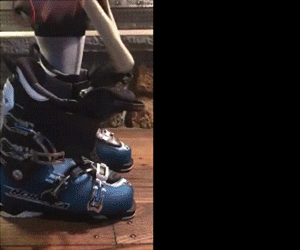Hello again ladies.
After ACL and MCL (and doubtless other) injuries to both knees in March, it appears, I hope, that I've joined the ranks of the Copers - and thanks for the reassuring threads posted on this Forum about that: it's given me a lot of hope over the past many months of sitting on the settee.
My knee surgeon in the UK told me that I can ski again "when you're strong enough" (without a brace, according to him). My physiotherapists, who have just seen me a few times and given me lots of exercises for strength and stretching, tell me the same. However, no-one will define what strong enough is! Apparently, I'm the expert, being the skier...
I've been doing all the exercises, and static cycling and now some hill walking, and in one way feel stronger now than I did before. In other ways I feel that my knees and leg muscles in general are far from ready to be attached to a pair of planks and aimed down a slippery hill, and I'm certainly not going to try it just yet. But one day, try it I must: scary as the thought is for many reasons.
So can anyone give me any indicators as to when you are ready? How did you choose when and how and where to try it again for the first time? (In the UK I can try an indoor slope, horrid as they are; else it's flying over to Europe come the next season.) Did any of you have to reach a minimum exercise tolerance or post-injury time? What tests or conditons did your doctors or physios put on you? Or is it just a case of take the plunge when you think you're ready, suck it and see and hope that you're not testing yourself to destruction?!
Thanks, all.
After ACL and MCL (and doubtless other) injuries to both knees in March, it appears, I hope, that I've joined the ranks of the Copers - and thanks for the reassuring threads posted on this Forum about that: it's given me a lot of hope over the past many months of sitting on the settee.
My knee surgeon in the UK told me that I can ski again "when you're strong enough" (without a brace, according to him). My physiotherapists, who have just seen me a few times and given me lots of exercises for strength and stretching, tell me the same. However, no-one will define what strong enough is! Apparently, I'm the expert, being the skier...
I've been doing all the exercises, and static cycling and now some hill walking, and in one way feel stronger now than I did before. In other ways I feel that my knees and leg muscles in general are far from ready to be attached to a pair of planks and aimed down a slippery hill, and I'm certainly not going to try it just yet. But one day, try it I must: scary as the thought is for many reasons.
So can anyone give me any indicators as to when you are ready? How did you choose when and how and where to try it again for the first time? (In the UK I can try an indoor slope, horrid as they are; else it's flying over to Europe come the next season.) Did any of you have to reach a minimum exercise tolerance or post-injury time? What tests or conditons did your doctors or physios put on you? Or is it just a case of take the plunge when you think you're ready, suck it and see and hope that you're not testing yourself to destruction?!
Thanks, all.

 And, boy, are they aching!
And, boy, are they aching!


 ; nor when I'm trying not to make sudden sharp avoidance stops or turns at the moment.)
; nor when I'm trying not to make sudden sharp avoidance stops or turns at the moment.)
 ) I don't think that I'm going to feel confident skiing at all, especially if I have a bad leg or two, unless I also feel very very confident in my own abilities. Not that I was too bad before, I reckon: but I can get a good deal better. I just need to prove to myself first that it is physically possible and safe to ski, then I can go and learn how to do it properly.
) I don't think that I'm going to feel confident skiing at all, especially if I have a bad leg or two, unless I also feel very very confident in my own abilities. Not that I was too bad before, I reckon: but I can get a good deal better. I just need to prove to myself first that it is physically possible and safe to ski, then I can go and learn how to do it properly.